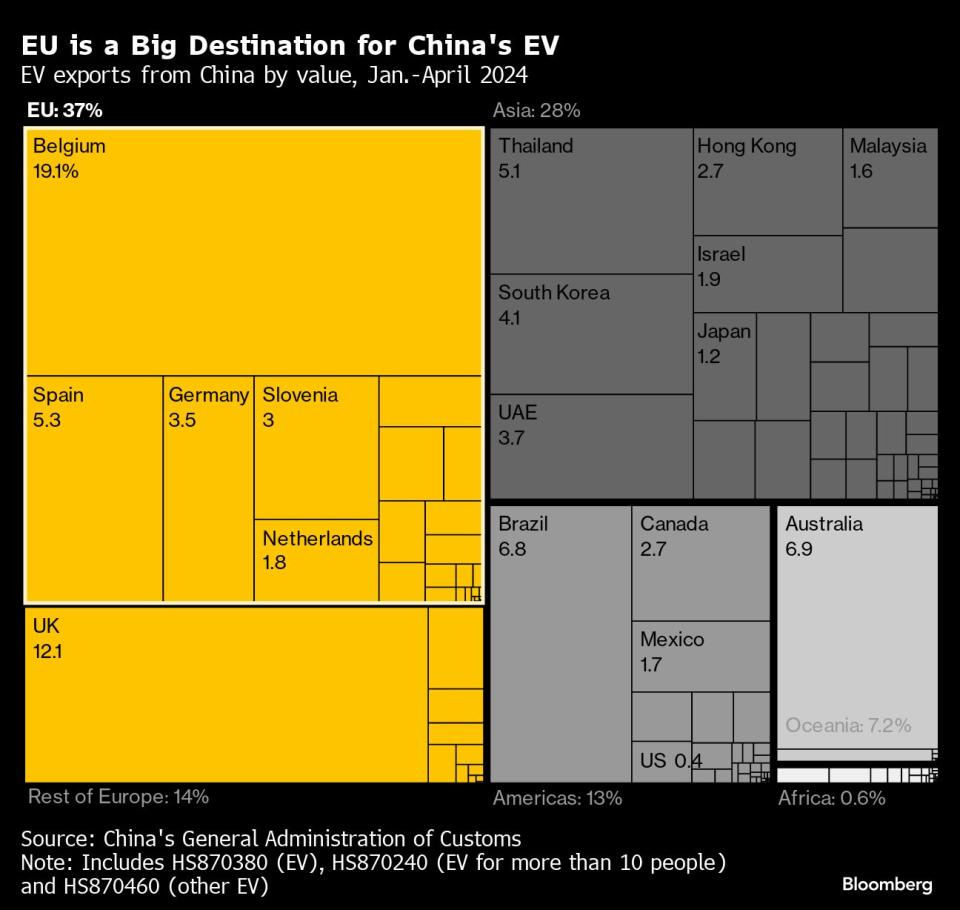China Floats Perks for German Carmakers to Prevent EV Levies

(Bloomberg) -- Beijing has suggested Germany’s luxury car manufacturers could benefit if Berlin convinces the European Union to drop tariffs on Chinese electric-vehicle exports.
Most Read from Bloomberg
How Long Can High Rates Last? Bond Markets Say Maybe Forever
Jain Global Raises $5.3 Billion, Secures Cash From Abu Dhabi
BuzzFeed Struggles to Sell Owner of Hit YouTube Show ‘Hot Ones’
Tech Keeps a Lid on US Stocks as Nvidia Tumbles: Markets Wrap
China floated lowering its existing tariffs on large-engine cars in return for scrapping planned EV levies on imports from the Asian nation, according to people familiar with the discussions, who asked not to be identified as the talks were confidential. Beijing currently imposes a 15% fee on passenger vehicles from the bloc.
China’s Commerce Minister Wang Wentao hinted at the possibility of the advantages to his German counterpart Robert Habeck during a meeting on Saturday in Beijing, one of the people said. Habeck’s three-day visit to the world’s No. 2 economy came weeks after the EU proposed hiking charges on electric cars to as high as 48% later this year.
The exchange reflects a mismatch between how the EU and China are approaching the dispute. The European Commission says it’s setting tariffs based on the legal conclusions of an in-depth study into Beijing’s massive state subsidies. The levies look to level the playing field by offsetting the Chinese aid with something of equal value.
But that legal exercise was always vulnerable to political pressure, and President Xi Jinping’s government has been dangling both carrots and sticks to persuade Berlin to help it horse-trade. Beijing had previously signaled it could unleash a 25% fee on large European cars, a move that would hit German luxury carmakers including Mercedes-Benz Group AG and BMW AG.
The danger for the commission is that Berlin — which already opposes the tariffs — might be persuaded by its massive auto industry to break rank and pressure the bloc’s executive arm and other member states, by using its weight as the EU’s biggest economy.
German Chancellor Olaf Scholz on Monday underscored his government’s wish for a negotiated solution. There is still time for that before provisional duties are set to be introduced from July 4, Scholz said in a speech to a business lobby congress in Berlin.
“However, it is clear that we will also need serious movement and progress from the Chinese side,” Scholz said.
The European Commission and China’s Ministry of Commerce didn’t reply to requests for comment. Germany’s Economy Ministry declined to confirm Wang’s comments.
Officials in Beijing still have some room left for negotiation, according to Deborah Elms, head of trade policy at the Hinrich Foundation.“The EU could always opt to postpone the imposition of tariffs, pending the outcome of negotiations,” she added. “As long as the two sides are making sufficient progress towards an answer, it’s possible to stop the clock.”
The bartering in Beijing came as the EU’s trade chief Valdis Dombrovskis held a “candid and constructive” video call with his Chinese counterpart over the weekend. Senior officials from the two sides have barely spoken to each other during the probe.
“The two sides agreed to engage on the basis of facts and in full respect of WTO rules,” said Olof Gill, a European Commission spokesperson. “The EU side emphasized that any negotiated outcome to its investigation must be effective in addressing the injurious subsidization.”
For China, stopping the tariffs could send an important signal to other major economies. Canada is now also mulling potential fees on Chinese EVs in order to align with actions taken by the EU and US, where President Joe Biden has announced a 100% charge on such products.
In recent months, Chinese government departments, party-controlled media and other state-affiliated groups have rolled out an escalating campaign of threats targeting French brandy, Spanish ham, German large-engine vehicles and other sectors such as aviation.
China has looked to transform discussions into a mercantile negotiation and has been trying to divide member states by pressuring them bilaterally, some of the people said. While the EU is open to solutions that would achieve the same effects as countervailing tariffs, those would need to abide fully with World Trade Organization rules.
Ideas such as China introducing self-imposed quotas on its EV exports instead of tariffs are unlikely to meet those criteria, said one of the people familiar.
The EU notified EV manufacturers earlier this month that it will introduce new provisional tariffs in July following a months-long investigation. Duties will initially be introduced by a guarantee, only to be collected if definitive fees are imposed in November.
Some companies face tailored rates. SAIC Motor Corp. is bracing for a 38.1% tariff on top of the existing 10% rate, BYD an additional 17.4% and Geely — which owns Volvo Car AB — an extra 20% charge. Other EV producers in China that cooperated with the investigation but have not been sampled will be subject to a weighted average duty of 21%, while others will see a 38.1% levy.
China has blasted the move as protectionist and not based on objective criteria. It has threatened to retaliate and has already launched anti-dumping probes into pork and brandy imports.
As talks continue, China could also try to provide greater transparency on industry policy funding or offer to withdraw subsidies the EU has identified as being inconsistent with WTO obligations, according to Scott Kennedy, a China specialist at the Center for Strategic and International Studies.
“I’d be surprised if we see anything significant before an 11th-hour offer from China just prior to the deadline for final penalties in early November,” he added.
--With assistance from Jorge Valero, Lucille Liu, Josh Xiao, Fran Wang and Michael Nienaber.
(Updates with Scholz comments starting in seventh paragraph)
Most Read from Bloomberg Businessweek
©2024 Bloomberg L.P.

 Yahoo Finance
Yahoo Finance 